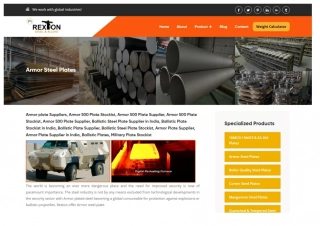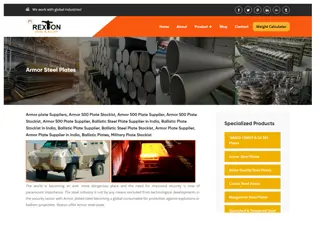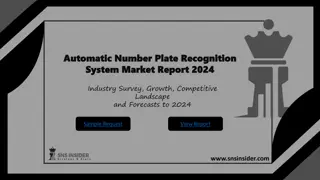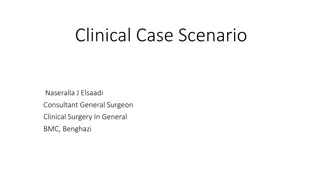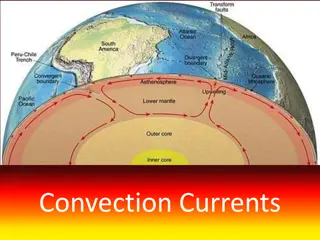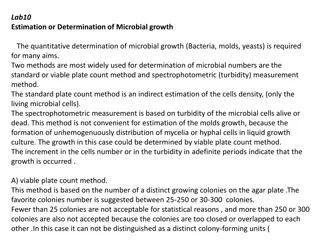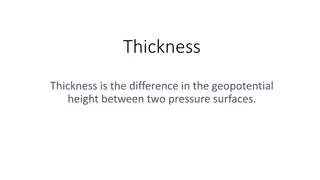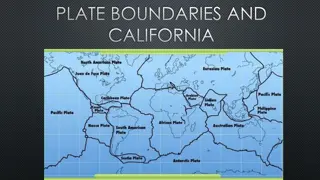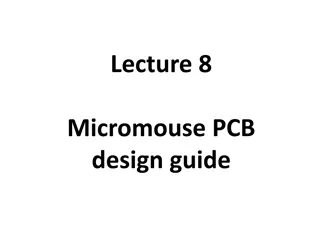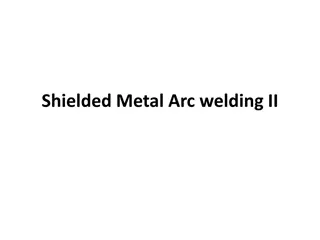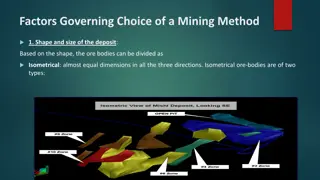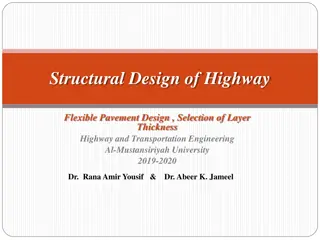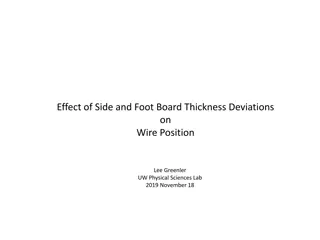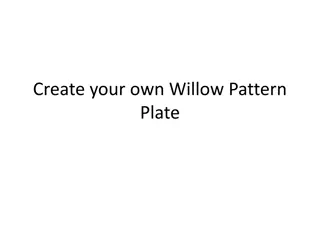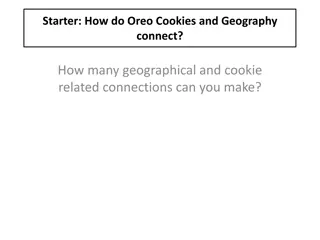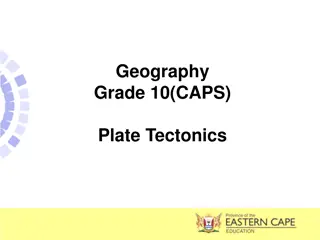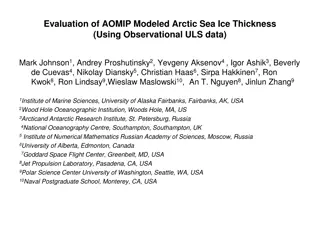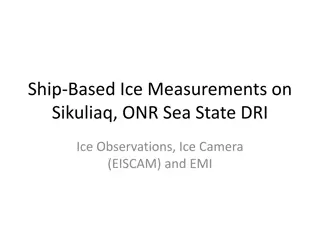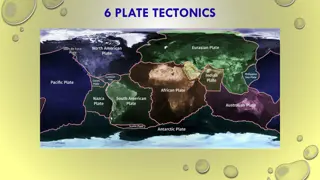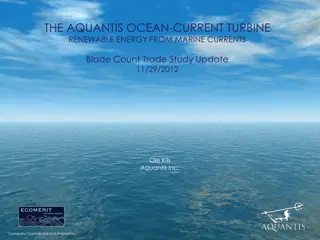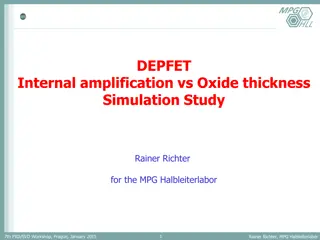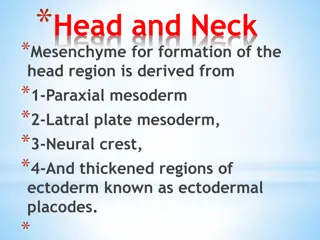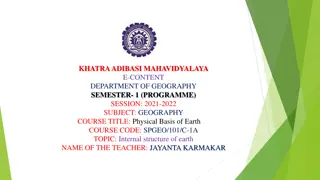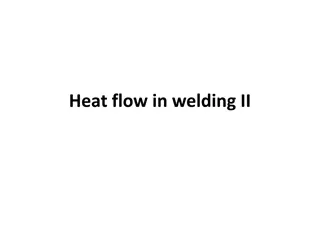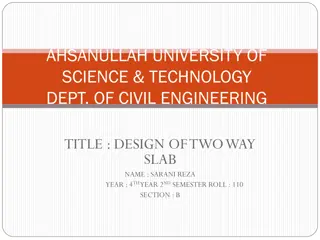400 BHN Plates, Steel 400 BHN Plates, 400 BHN, Wear Resistent 400BHN Steel Plate
Rexton Steel & Alloys is the largest manufacturer and suppliers of 400 BHN Abrasion Resistant Steel Plate, 400 BHN Plate, BHN 400 Steel Plate, Hardox 400 Plates in Mumbai, India.
4 views • 7 slides
Armor Steel Plates
Rexton Steel & Alloys is one of the top leading Supplier, Manufacturer and Exporter of Armor Steel Plates, Armor 500 Plate, Armor Plate, Ballistic Steel Plate, Ballistic Plates, Military Plate, Armor Steel Plate at low prices to our clients from Mumbai, India.
2 views • 6 slides
Armor Steel Plates, Armor 500 Plate, Armor Plate, Ballistic Steel Plate, Ballist
Rexton Steel & Alloys is one of the top leading Supplier, Manufacturer and Exporter of Armor Steel Plates, Armor 500 Plate, Armor Plate, Ballistic Steel Plate, Ballistic Plates, Military Plate, Armor Steel Plate at low prices to our clients from Mumbai, India.
1 views • 6 slides
Understanding Plate Tectonics: Meaning, Concepts, and Plate Margins
Plate tectonics is a scientific theory explaining the movement of Earth's lithospheric plates. Developed by various scientists, it involves the drifting of plates over the Earth's surface, leading to phenomena like earthquakes and mountain formation. The theory is based on continental drift and sea-
5 views • 7 slides
ENAMEL
Enamel, the hardest calcified tissue in the human body, forms a protective covering over the teeth, adapting them for mastication. Its thickness varies across different surfaces of the teeth, with maximum thickness found on cusps. The structure of enamel makes it brittle, especially when it loses su
2 views • 46 slides
Winnerslabels - License plate stamping foil manufacturer in Asia, India
A hot stamping foil process involves the application of heat and pressure on metallic foil surfaces or holograms onto other materials such as carton board, laminated board, plastics and other corrugated board products.\n\nA hot stamping foil process comprises embossing, holographic application, comb
4 views • 3 slides
Automatic Number Plate Recognition System Market
Uncover the benefits of Automatic Number Plate Recognition Systems, which use advanced imaging technology to automatically identify and manage vehicle license plates. This system enhances security, streamlines toll collection, and improves traffic ma
0 views • 7 slides
Understanding Malignant Melanoma: Types, Signs, and Prognosis
Malignant melanoma is a serious skin cancer with various types, including superficial spreading, nodular, acral lentiginous, lentigo maligna, and amelanotic. Recognizing early signs such as ABCDEF (Asymmetry, Borders, Colour, Diameter, Evolving, Funny-looking) is crucial for prompt diagnosis. Macros
2 views • 25 slides
Exploring Plate Motion and Fossils in Science Class
Dive into the fascinating world of plate motion and fossils in this science lesson. Students will learn about the role of scientists, investigate fossils as time capsules, meet a paleontologist, and explore how Dr. Wilson's research sheds light on Earth's geologic history. Engaging activities such a
0 views • 25 slides
Understanding Convection Currents in Earth's Systems
Convection currents refer to the movement of heat by fluids like liquids and gases, transferring heat from one place to another. They play a significant role in the geosphere, atmosphere, and hydrosphere of the Earth, influencing phenomena such as plate tectonics, winds, and ocean currents. In the g
0 views • 12 slides
Methods for Determination of Microbial Growth
Quantitative determination of microbial growth is crucial for various purposes, with two commonly used methods being the standard plate count and spectrophotometric measurement. The standard plate count method estimates living microbial cell density, while spectrophotometric measurement relies on tu
2 views • 6 slides
Understanding Atmospheric Thickness and Its Applications
Atmospheric thickness refers to the difference in geopotential height between two pressure surfaces, which is dependent on the mean virtual temperature of the layer in between. This concept plays a key role in determining temperature gradients, identifying fronts, and aiding in weather forecasting,
0 views • 11 slides
Plate Boundaries and Geological Events in California
California is located on a plate boundary experiencing major geologic events. The state's landforms are shaped by plate tectonic activity. Understanding stress types at plate boundaries can help prevent damage and save lives. The interaction at plate boundaries plays a crucial role in shaping Earth'
0 views • 14 slides
Understanding Processes Shaping Earth: Lithosphere, Plate Tectonics, and Effects
Explore the components of our planet, such as the lithosphere, hydrosphere, atmosphere, and biosphere. Learn how the lithosphere, consisting of the Earth's crust and top solid mantle, interacts through plate tectonics, causing movements that shape the Earth's surface. Discover the concept of Pangaea
0 views • 31 slides
Heat Transfer and Drag Force Calculation for Air Flowing over a Heated Flat Plate
Calculating the heat transferred and drag force exerted on the first 40 cm of a flat plate when air at 27°C and 1 atm flows over it at 2 m/s. The plate is heated to 60°C along its entire length. Using fluid friction analogy to analyze the heat transfer and drag force.
3 views • 8 slides
Micromouse PCB Design Guide
This guide provides step-by-step instructions for designing a PCB for a micromouse. It covers components placement, sensor positioning, trace thickness, and trace style to optimize the performance of the micromouse. Proper positioning of components and sensors is crucial, along with considerations f
0 views • 22 slides
Welding Current Selection and Electrode Factors in Shielded Metal Arc Welding
When selecting the welding current for Shielded Metal Arc Welding (SMAW), considerations such as plate thickness, cable length, arc initiation ease, arc blow, and welding position play crucial roles. Direct Current (DC) is preferred for thin sheets and odd position welding, while Alternating Current
0 views • 10 slides
Visualizing Relationships with Data: Earthquakes, Volcanoes, and Plate Tectonics
Explore the locations of earthquakes and volcanoes to understand plate boundary zones, compare plate motion in different regions, and determine plate boundary zones using various data sources. Follow step-by-step instructions to study maps, analyze earthquake and volcano distributions, and engage in
0 views • 37 slides
Factors Influencing Mining Method Selection
Factors affecting the selection of a mining method include the shape and size of the deposit, the deposit's contact with country rock, thickness of the ore body, and the dip of the deposit. The shape of the deposit, contact with country rock, and thickness of the ore body impact the feasibility and
0 views • 14 slides
Selection of Layer Thickness in Highway Flexible Pavement Design
Selection of layer thickness for highway flexible pavement design involves determining an initial pavement structure's design structural number and then choosing appropriate thicknesses to meet or exceed the required structural number. Cost-effectiveness, construction constraints, and maintenance co
0 views • 11 slides
Impact of Board Thickness Deviations on Wire Displacement
In this study by Lee Greenler at UW Physical Sciences Lab, the effect of side and foot board thickness deviations on wire position was analyzed. The displacement of the wire was found to vary based on the cosine factor, with potential displacements up to ~0.5mm near the pin. Different cases were con
0 views • 5 slides
Umpire Clinic Essentials: What to Wear, Game Time Tips, and Plate Mechanics
Learn key takeaways from a baseball umpire clinic, including guidelines on attire, preparation, game time procedures, plate mechanics, and dealing with coaches and fans. Discover the importance of appearance, proper equipment, and essential plate umpire movements for different game scenarios.
0 views • 61 slides
The Theory of Plate Tectonics: Continents in Motion
Earth's crust and lithosphere have changed over geologic time, forming tectonic plates that move due to convection currents. The concept of plate tectonics explains how continents fit together, the existence of a supercontinent called Pangaea, and natural phenomena like earthquakes and mountains. Ea
0 views • 28 slides
Exploring Plate Boundaries: Convergent, Divergent, and Transform Faulting
Delve into the world of plate boundaries by understanding convergent, divergent, and transform faulting. Discover various examples worldwide, describing their physical locations, major tectonic plates involved, resulting landforms, lithosphere types, and associated catastrophic events. Learn about t
0 views • 5 slides
Plate Tectonics and Boundaries Overview
The content discusses various aspects of plate tectonics and boundaries, including the best procedures for assessments, features at convergent and divergent boundaries, the movements of ocean plates relative to islands, identifying plate boundaries on a map, and reasons for the delay in accepting pl
0 views • 7 slides
Advanced Cooling Solutions: ACS Cold Plate Focus Areas
Introduction to ACS Cold Plate focus areas led by Jessica Gullbrand from Intel. The objective is to standardize liquid-cooled solutions without hindering innovation. The ongoing focus includes approval of cold plate requirements, initiation of Open Rack V3 Blind Mate Liquid Cooling, and various work
0 views • 20 slides
DIY Willow Pattern Plate Activity
Dive into the world of Willow Pattern design by creating your own plate art inspired by the classic poem. Gather materials, choose a verse, and let your creativity flow onto a paper plate or circle. Explore examples and get inspired!
0 views • 4 slides
Exploring the Connection Between Plate Tectonics and Oreo Cookies
Discover the unique ties between plate tectonics and Oreo cookies through a creative exploration of tectonic plate boundaries using Oreo cookies as a tangible model. Learn about the structure of the Earth, types of plate boundaries, and the movement of tectonic plates in a hands-on and engaging mann
0 views • 15 slides
Understanding Plate Tectonics and Earth's Surface Features
The study of plate tectonics reveals how the Earth's crust is divided into tectonic plates, leading to various types of plate boundaries like divergent, convergent, and transform. These movements result in earthquakes, volcanic eruptions, and landform changes such as folding and faulting. Different
0 views • 15 slides
Understanding Earthquakes and Plate Tectonics
Rapid Earth Movement, specifically earthquakes, is a natural disaster causing destruction and fear. Plate tectonics play a crucial role in the occurrence of earthquakes and volcanoes. The movement of Earth's plates at plate boundaries results in different geological features like fold mountains. Thi
0 views • 36 slides
Evaluation of Arctic Sea Ice Thickness Using AOMIP Model and ULS Data
This study evaluates Arctic sea ice thickness utilizing AOMIP modeled data and observational ULS data. The comparison includes ice thickness from models, linear regressions, histogram differences, correlations, and model issues. Location comparisons and model versus observation thickness variances a
0 views • 42 slides
Comprehensive Ship-Based Ice Measurements and Observations on Sikuliaq for Sea State DRI
This collection of images showcases various ship-based ice measurements and observations conducted on the research vessel Sikuliaq for Sea State DRI. The images include aspects such as sea ice observations, snow and ice thickness measurements, evaluation of orthorectification, and new snow and ice i
0 views • 8 slides
Exploring Plate Tectonics and the Scientific Method
Dive into the world of plate tectonics and the scientific method in this lesson. The session covers vocabulary and grammar review, giving and receiving feedback, learning new concepts related to plate tectonics, and understanding participles and participial adjectives. Explore the theory of plate te
0 views • 8 slides
Aquantis Ocean Current Turbine Renewable Energy Analysis
An update on a trade study regarding blade count for Aquantis ocean current turbine, discussing ideal hydrodynamic and structural models, calculation approaches, and preliminary results. The study explores the effect of thickness-to-chord ratio on rotor section weight and spar thickness for two- and
0 views • 10 slides
DEPFET Internal Amplification vs. Oxide Thickness Simulation Study by Rainer Richter
The study explores the behavior of DEPFET internal amplification in comparison to oxide thickness through simulations conducted by Rainer Richter at the MPG Halbleiterlabor workshop. It delves into the differences in behavior between DEPFET and classical MOS transistors, shedding light on the reason
0 views • 11 slides
Effective Compaction Techniques for Civil Engineering Projects
Understanding the variables involved in soil compaction operations is crucial for developing a successful compaction plan. Factors such as soil moisture content, lift thickness, number of passes, ground contact pressure, compactor weight, and speed play key roles in achieving optimal compaction resu
0 views • 42 slides
Development of Head and Neck Mesenchyme in Embryonic Formation
The formation of the head and neck region in embryonic development involves mesenchyme derived from paraxial mesoderm, lateral plate mesoderm, neural crest, and ectodermal placodes. Paraxial mesoderm contributes to brain case and muscle formation, while lateral plate mesoderm forms laryngeal cartila
0 views • 34 slides
Understanding Earth's Internal Structure: A Geographical Perspective
Deep parts of Earth's interior are studied indirectly through geophysics, including seismic waves, magnetic fields, gravity, and heat. Seismic studies reveal Earth's layers - crust, mantle, and core - each with distinct properties and compositions. The lithosphere, comprising the upper mantle and cr
0 views • 12 slides
Welding Heat Flow and Cooling Rate Calculations
Understanding welding heat flow and cooling rate calculations is essential for determining the critical cooling rate in welding processes. Factors such as plate thickness, number of passes, and relative plate thickness play a crucial role in selecting the appropriate equations for calculating coolin
0 views • 10 slides
Design of Two-Way Slab - Basic Steps and Reinforcement Details
Design of a two-way slab involves choosing layout and type, determining slab thickness, selecting a design method, calculating moments, distributing moments across the slab width, designing reinforcement for beams, and checking shear strengths. The process also includes determining maximum bending m
0 views • 14 slides

